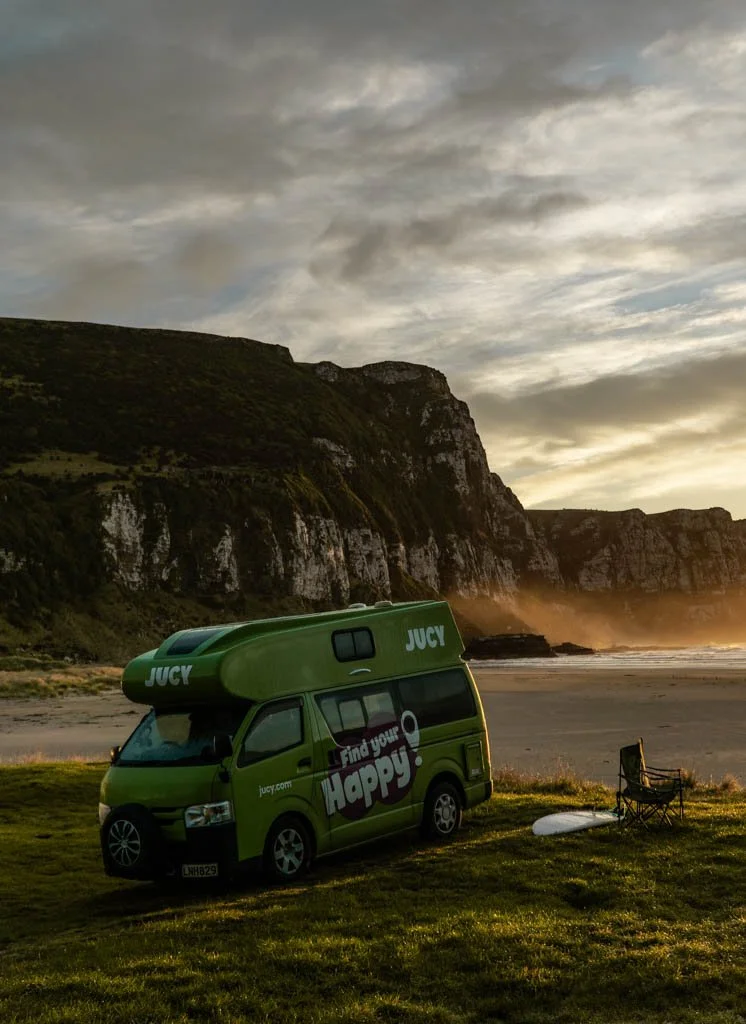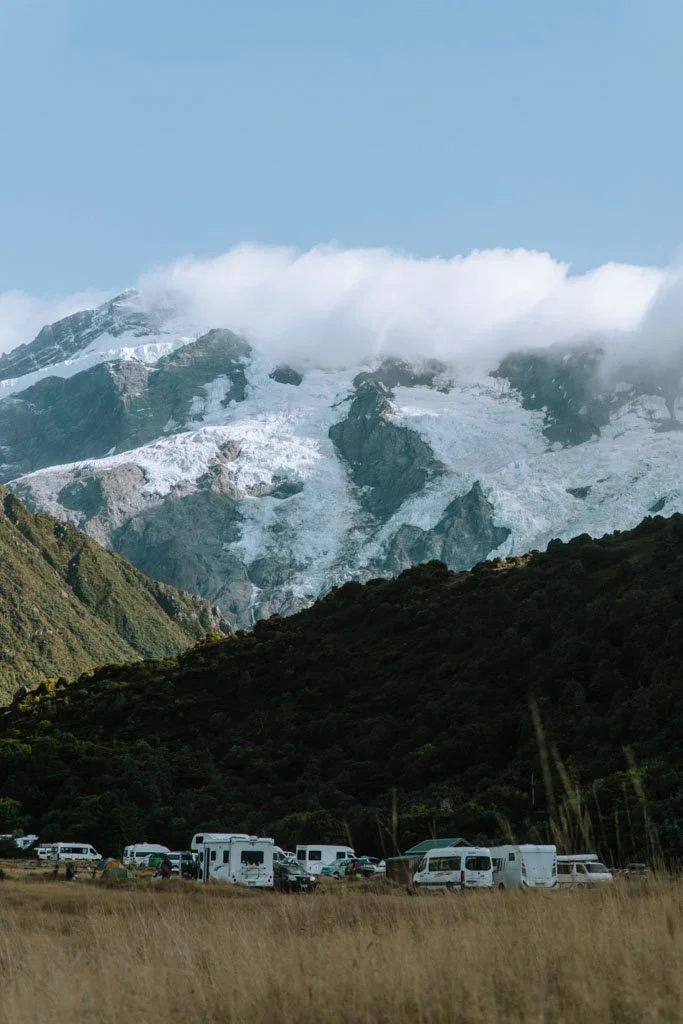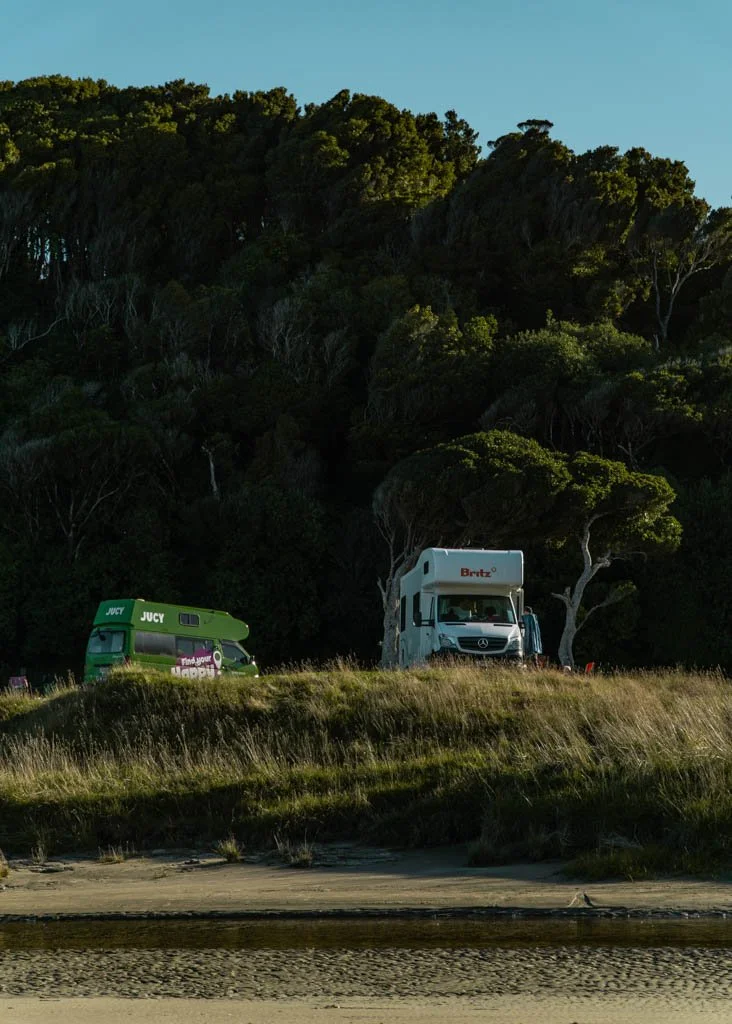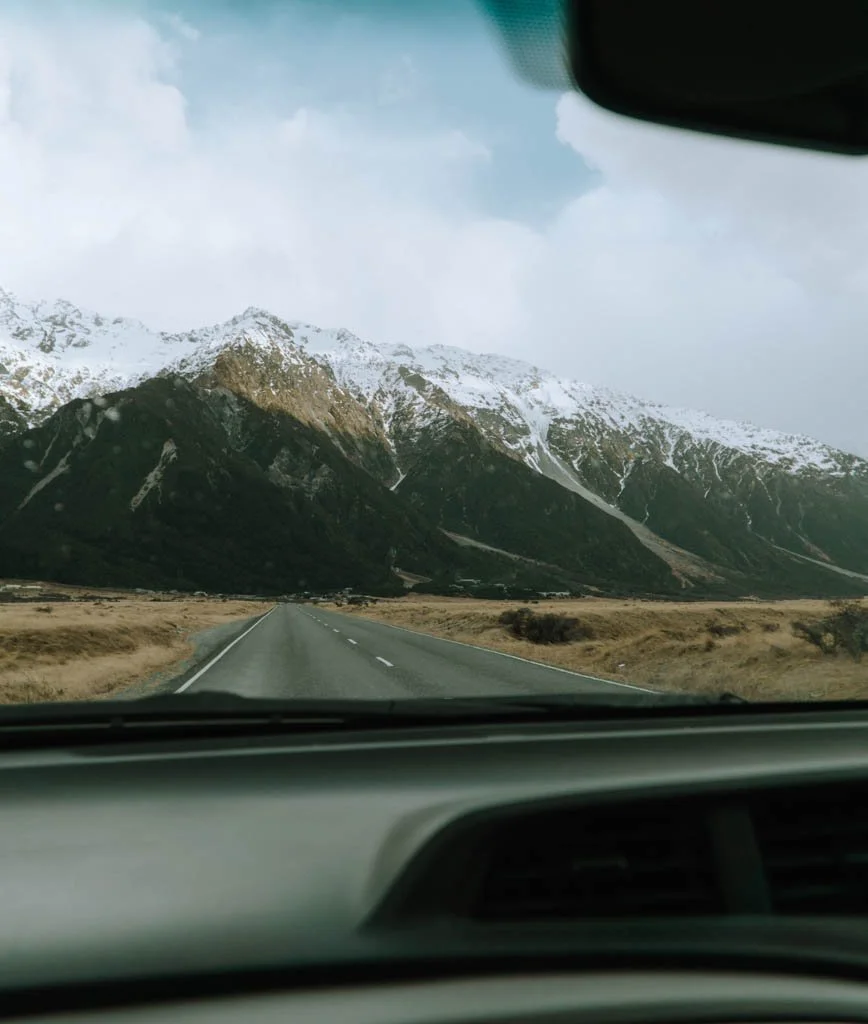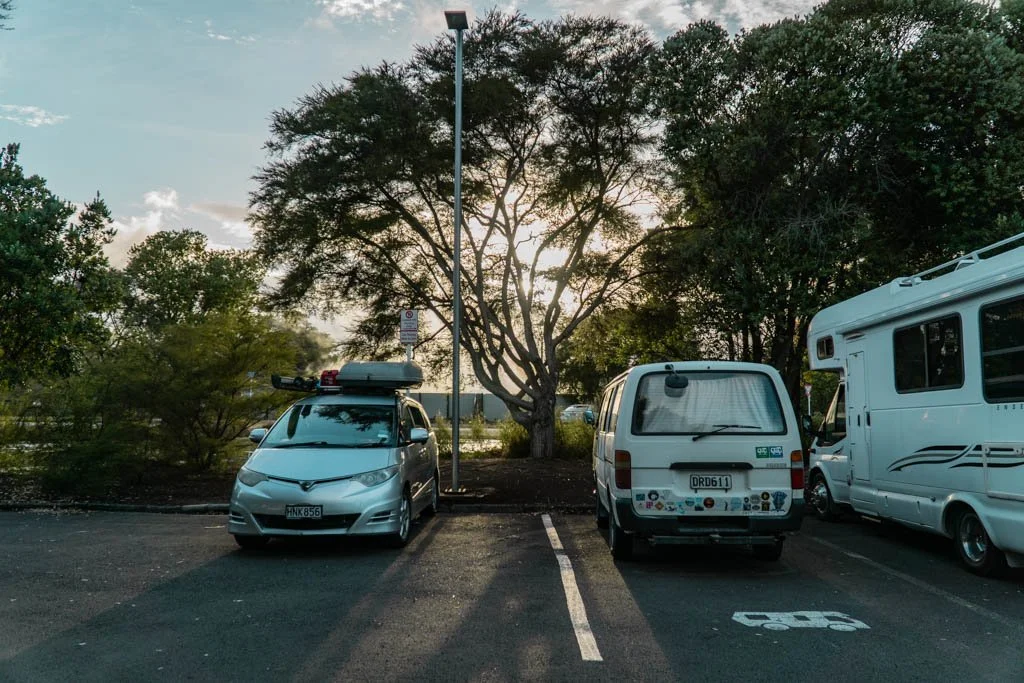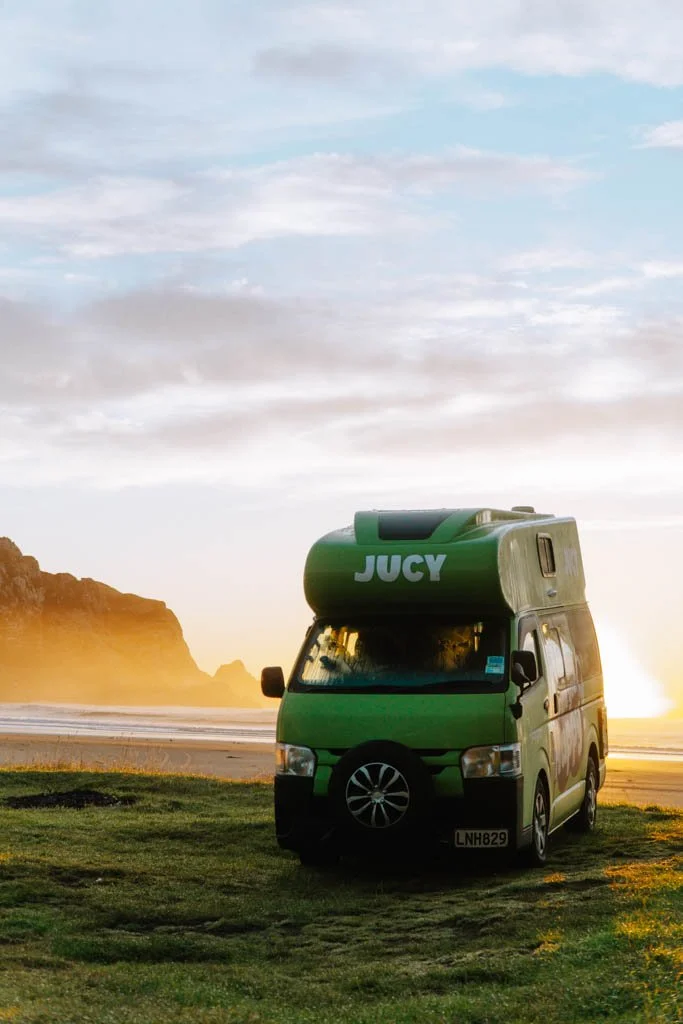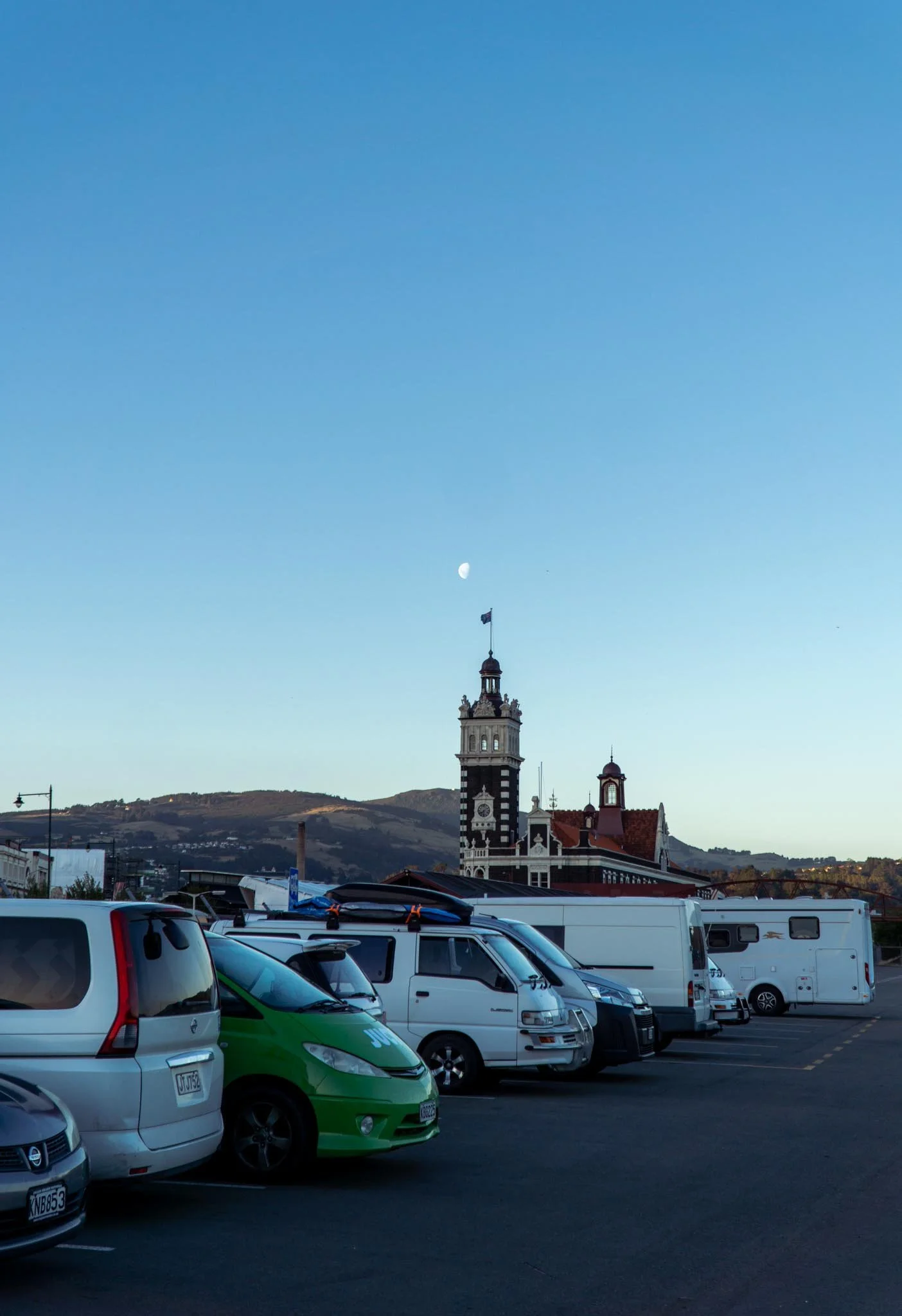Is renting a campervan in New Zealand worth it?
Thoughts on whether you should rent a car or a campervan (from someone who has done both)
Waking up to sunrise right by the beach — what campervan life in New Zealand is all about
Disclosure: This page contains affiliate links, which means I may earn a commission if you book via those links, at no extra cost to you. Thanks for your support.
My campervan was almost never tidy.
If it wasn’t muddy hiking boots in the front footwell, it was a sandy beach towel; my cooler was foisted onto my bed when I was driving; frequent tea breaks meant spoons left in my sink.
It wasn’t glamourous. But travelling New Zealand in my campervan made me unbelievably happy.
Rolling open your van door, and seeing the beach, or a forest, or an epic view right in front of you, is magical.
The campground at Aoraki/Mount Cook is an epic place to stay
New Zealand’s main attractions are its landscapes and outdoor activities, and a campervan will get you closer.
Whether it’s camping in Aoraki/Mount Cook and falling asleep to the sounds of rock and ice falls on the mountain peaks surrounding the campground, or camping at a beach at the end of a long gravel road where there’s no one else around, van life in New Zealand makes a lot of sence.
It’s a lifestyle.
I used to work for JUCY Rentals, one of New Zealand’s most popular campervan companies, which is where I first got a taste of campervan life.
My first ever camping trip was in a JUCY van in Taranaki — as employees, we had the chance to take the vans out for a spin
Not long after that I bought my own campervan, and I’ve spent months living in my van while travelling around New Zealand.
I’m excited that you’re curious about exploring Aotearoa in a campervan. Having a van gave me the greatest sense of adventure.
But, renting a campervan in New Zealand isn’t cheap, and it comes with some additional considerations, like manoeuvring a larger vehicle on our narrow roads.
And not showering for days at a time.
So, I have put together some of my thoughts on campervan travel in New Zealand, to help you decide between a home on wheels or a rental car and hotel rooms.
The short version
Do I think renting a campervan is worth it if you’re paying more than $600 a day for a ‘budget’ campervan (looking at JUCY here)?
Honestly, not really. High prices are worth it if you’re in a motorhome and get to travel with luxuries like a toilet and shower on board, but if you’re in a JUCY campervan, it’s hard for me to think of that as a good deal.
I’m a frequent traveller and don’t mind roughing it, though (I now just camp in the back of my car because buying a campervan has become so expensive).
It’s different if this is your once-in-a-lifetime trip, and if the price tag isn’t a deal breaker. If money wasn’t an object, I would be out there on the roads in a campervan every weekend, it’s that much fun.
If you’re somewhere in the middle, and have a reasonable budget but want to feel like you’re not paying a premium to be unwashed for weeks at a time, it helps if you can be flexible. Those mega high prices are really only for two months of the year, in the peak summer season.
I do think a campervan trip is worthwhile at a slightly lower price point.
Rent a campervan from mid-March onwards and you can still have an epic time, with beautiful weather, for as little as a third of the price.
Top campervan rental companies
Motorhome Republic is the easiest place to compare campervan prices across rental companies
For smaller campervans, Matt and Dans campervans, Epic Campers, and Big Little Campers are all awesome, locally owned companies with comfortable van designs.
For slightly larger vehicles, Kia Ora Campers is owned and operated by a local family. I haven’t rented with them but they get great reviews.
If you want a larger vehicle, Wilderness Motorhomes or Kiwi Motorhomes are both premium, locally owned options (Kiwi Motorhomes has the added bonus of no branding on their vehicles, so you can fly under the radar).
JUCY Rentals have a range of vehicles and more flexible drop off points, but you will stick out like a sore thumb everywhere you go (and renting with JUCY can be very hit or miss. More on what that means below).
Read campervan reviews: Although I’m not sure how much stock to put in some online reviews, it’s always nice reading about other people’s experiences. Rankers is a good resource for reading reviews of campervan rental companies.
Renting a car vs. a campervan in New Zealand
The main difference between campervans and car rentals is that campervans give you more freedom and a more adventurous style of travel.
New Zealand is different from places like the United States or England, in that there aren’t that many big towns. You can drive for hours in some places without coming across a hotel or other facilities, so the best thing to do is camp.
Plus, no one is flying halfway around the world to visit New Zealand cities.
On the West Coast of the South Island for example, some of the best places to stay are close to the walks and beaches — away from the (frankly uninspiring) towns like Greymouth or Westport.
Staying somewhere like Gentle Annie’s Seaside Campground (one of my all time favourites) means you get to experience more of the wilderness and have access to more walks.
I am a huge fan of the van lifestyle in New Zealand, and I have many friends who also swear by it — some are on their third campervan, they love it so much.
There’s an important difference there, though, and that’s that locals don’t need to pay for campervan rental costs, which can be exorbitant.
Hiring a campervan isn’t necessarily cheaper than renting a car and staying in hotels. You could be looking at spending thousands of dollars on just a couple of weeks of campervan hire, which makes for a pretty expensive holiday.
The cost of campervan travel in New Zealand has climbed a lot and no longer means ultra-low budget travel. Even the fines for freedom camping illegally have gotten more expensive, while freedom camping spots have become more restricted.
A freedom camping spot in the centre of Rotorua
There are still people who use a campervan to get around on a budget, but these people tend to be visiting New Zealand for longer and buy their own vehicle, to stay in cheap and free campsites.
If you’re visiting for 2-3 weeks and don’t have the time or wherewithal to buy a vehicle, renting a campervan is your only option.
It can be expensive to hire a campervan, especially if you’re travelling in the summer months — between November and March, availability is lower and prices are higher.
You might get better deals outside of those months, but then you have to factor in colder and wetter weather (which might mean paying for more premium campsites with hot showers) and less daylight for activities.
On top of your campervan hire costs, you have to budget for petrol (which is more expensive for heavy campers than it is for small hire cars), powered campground costs, and so on.
This can add up to more than the cost of car + hotel.
This is fine if you approach your campervan trip with the mindset that it’s about adventure and the overall experience, rather than cutting out accommodation costs.
My car camping set up
Less comfortable, also less expensive
If you really want to do New Zealand on a budget, or want to experience the camping lifestyle without the cost of a campervan, rent a car big enough to sleep in and go car camping. I drove a Snap Rentals car from Queenstown to Auckland over three weeks, and slept in the back of it many nights (and I will happily sleep in the back of my own station wagon on trips, too).
Car camping isn’t as comfortable as having a van bed — I sleep on my hiking mat in the back of the car — but it’s cheap, easy, and lets me stay in a lot of the same places I would in a campervan.
Things to consider when you’re renting a campervan
When renting a campervan, pick up and drop off locations are much more limited than rental car options. Often, you can only pick up/drop off in Auckland and Christchurch, which means you need to factor in time to get back to the drop off point.
With a rental car, you’re more restricted in where you can stay (rooms aren’t always available in more remote areas), but you can be more flexible with where you start and end your trip, and whether you take other modes of transport like the TranzAlpine Train.
Campervans can cost twice as much, sometimes more, in summer. For the best deals, travel in the off season.
It is often cheaper to travel from Christchurch to Auckland (as much as $400 less with Mad Campers, for example).
A quick note on booking in advance
If you have decided to rent a camper in New Zealand, you should think about booking at least 4 months in advance for any dates between mid-December and late March.
Those are peak months — with the peak peak months late December to late January — and availability around those times will be limited.
If you’re travelling in the shoulder seasons or winter, you don’t need to worry so much. Around 1-2 months in advance would be fine for most companies.
The other thing to factor into your plans is the ferry between the North and South Islands. You’ll want to book that a couple of months in advance if you’re travelling in summer as well.
Other than those key details, you don’t need to worry about booking campgrounds in advance. I often book on the fly, the day before or sometimes on the same day, and I’ve never had an issue.
The pros and cons of travelling New Zealand in a campervan
Camping beachside at The Store
Campervans can be big and clunky to drive on New Zealand’s roads. In New Zealand, locals can get impatient when caught behind lumbering campervans on narrow roads. The good news is, there are usually lots of passing bays, or safe spots to pull over and let traffic pass. This is a lot less stressful than having people attempt risky manoeuvres to get around you.
You need to be pretty organised and disciplined to keep it tidy. I guess the same could be said of a rental car (I have a talent for turning any space into a bomb site). But it takes a lot of energy to keep on top of campervan chores.
How much does campervan rental cost (and is it worth it)?
Campervan rentals in New Zealand can be expensive, especially if you want to travel in the warmer summer months.
The cost of campervan rentals in New Zealand varies widely depending on the time of year and the company. A budget campervan can cost around $100 in summer, or $50 in winter.
Between November and March, bigger campervans with more facilities can cost as much as $400 a day.
Another thing I would consider is that having a campervan doesn’t mean you won’t be paying for accommodation at all. You’ll probably end up staying in freedom camps less than you anticipate.
I usually use a combination of freedom camping and DOC campsites which are $15-$20 a night for a basic camp. You might also want to have a few holiday parks in the mix, to take advantage of facilities like hot showers and laundry.
So on average, I’d say to factor in $20 a night for campgrounds.
If you’re planning on travelling in the summer months, book well in advance.
You’ll get cheaper prices after Easter, from May onwards, up until around October.
If you can, try to avoid paying for excess reduction. Your travel insurance should cover excess reduction as part of your policy, and if it doesn’t you can usually add it for a one-off fee that’s less than the daily cost of excess reduction most campervan rental companies offer.
Campervan relocations can be a good way to travel for cheap, but you’ll be very limited in what you can do.
The initial price you see probably won’t be the price you end up paying. On top of the base price, you need to factor in excess reduction/insurance, any add ons (you might have to pay for extras like tables, heaters).
Here are some other costs to factor into your campervan hire:
The cost of the gas in your campervan — some rental companies require you to fill up the gas bottle before returning the vehicle.
Petrol
If you have a diesel vehicle, you might also need to pay road user charges (RUCs)
Toll roads
Dirt cheap: Lucky Rentals
Budget: Mad Campers, Spaceship Rentals
Mid range: Jucy
High end: Kiwi Motorhomes, Wilderness Motorhomes
A lot of campervan companies have annoyingly low budget websites. You might have to email for a quote. Or, you can compare prices on Motorhome Republic, which is the easiest place to look at prices side by side:
The best campervan rental companies in New Zealand
As a disclaimer, I haven’t rented from every campervan rental company in New Zealand, so I can’t definitely say which option is the best. But, I used to work for a campervan company (JUCY) so I have some insider knowledge.
Having tried out a few rental options, and travelled in a van a lot myself, I have a few thoughts on which rental companies are the best. Let’s get into it.
A quick note on self-contained vs non self-contained: If you want to have the flexibility to freedom camp, make sure you’re hiring a self-contained vehicle. This means a campervan needs a fixed toilet and a green certification sticker.
Wilderness Motorhome Rentals
Pros:
Locally owned
No road restrictions
Beautifully kitted out motorhomes
Cons:
Only Auckland and Christchurch pick up/drop off
Wilderness Motorhomes is probably the best of the more luxurious campervan options.
Their motorhomes come in a range of sizes, but they are all equipped with high end amenities. If comfort is a priority for you, the beds and bathroom facilities in a Wilderness vehicle might suit you.
I’ve never travelled in a Wilderness motorhome — I’m too chicken to drive a vehicle this size.
One of my colleagues at Jucy used to swear by Wilderness though. She had high standards of luxury (without good showers, the Jucy vans didn’t cut it for her) but Wilderness met all of her needs.
Another great thing about Wilderness is that they really encourage you to explore. Wilderness has a no roads restriction policy, so you can get as far off the beaten track as you want.
Also, the New Zealand family behind Wilderness comes from Thames, which is (nearly) where I grew up (I went to high school there).
Kiwi Motorhomes
Pros
Family/Maori owned and operated
A small fleet of motorhomes (around 35) which means there is a real focus on quality.
The motorhomes are unbranded, so you can travel around a bit more stealthily
Cons:
Higher price range
Only Auckland and Christchurch pick up and drop off
Photo via Kiwi Motorhomes
Another premium and luxury option is Kiwi Motorhomes.
I haven’t rented from Kiwi Motorhomes (again, far too much of a chicken driver to take on these big vehicles) but I have spoken to the owner, Leon, and he was a very genuine guy. (In his email signature, his job title is Fun Manager).
If you’re looking for more comfort and very well kitted out motorhomes, I would confidently recommend booking with Leon and his team.
They can offer more bespoke/custom rental packages; including anything from E Bikes, standard mountain bikes, portable Wi-Fi modems, smart TV’s, portable gas BBQ’s, Boogie boards, children’s attachable bike seats, flexible one way hire options, children’s & adult board games, DVD’s if they aren’t streamers and are one of the very few motorhome rental businesses that is small pet friendly.
The family owned and operated aspect means you’ll get a more personalised service — they really care about providing quality and care.
JUCY Rentals
Price range: Varies wildly from $35 for the cheapest model in low season, to $350 a day for the same camper in high season. Check prices here >>
Pros:
Can pick up and drop off at Queenstown, as well as Christchurch and Auckland
Range of sizes, from small to mid-sized campervans.
Cons:
No longer family owned and operated
Can be a chaotic operation, so expect some niggles when picking up your van and occasionally on the road
Full disclosure — I used to work full-time for Jucy, and I still work with their marketing team writing articles for their website on a freelance basis (take a look at their blog!).
I might be slightly biased, but I can say that I’ve been on multiple trips with Jucy campervans and loved all of them.
Jucy was started by two New Zealand brothers who are very dynamic and travel oriented. The Jucy campervans are true to this style, with plenty of details that have been carefully thought out to maximise your time on the road.
There’s nothing subtle about the bright green campervans, so forget trying to blend in at campgrounds. If you don’t mind the paintwork though, you’ll get to enjoy compact campervans that are relatively easy to drive, yet come with plenty of amenities.
The flagship Jucy Condo has enough space inside to stand up in, and a really well equipped kitchen that includes a fridge and plenty of storage space.
You can fit up to four people in the Condo, and while it’s more of a squeeze, I did a trip with two friends (3 of us in total) and we were pretty comfortable, both at night and during the day while driving.
One of the great things about Jucy is the support you get on the road. On one trip, our van broke down and we had to phone the reservations team for help. They directed us to the nearest garage, where a mechanic was able to take a look and fix the issue within a couple of hours.
A tip: If Jucy is out of your budget, check out Lucky Rentals. Jucy hands off retired campervans to Lucky, so you get basically the same model, just a bit older and more well used.
Other campervan companies
There are many more rental companies to choose from.
Much of a muchness: Apollo, Maui, Britz
All of these campervan companies are owned by THL Holdings. They offer a similar service in terms of well-equipped motorhomes that deliver what you need.
Budget campervan options
Travellers Autobahn
Spaceships
Happy Campers
Freedom camping can be unglamourous
A freedom campsite in Dunedin (it’s just a carpark by the train station)
Things to consider when choosing a campervan
What facilities do you need?
Campervan facilities range widely — you can choose from cassette or flush toilets, an inside or outside kitchen, a shower or no shower.
I’ve never hired a campervan with a shower.
You can find free showers at a lot of public beaches in New Zealand, although they are cold and open air (usually attached to the toilet blocks so people can shower after a swim).
You can also pay to enter public swimming pools, which have shower facilites.
For me, I was happy to go swimming a lot and call that a wash. You can find lots of good swimming spots in New Zealand’s rivers, so I stayed pretty clean in summer.
Size of the vehicle
campevans in new zealand come in a ragne of sizes from compact camping cars to X-berth motorhomes.
pick a size that suits you
I’ve travelled in a 3-berth Jucy with 2 friends and it was comfortable,
Tip: Unless you have a high-top van, pick a model with the kitchen in the back (like in my van, pictured up the top). This means you can cook standing up and won’t have cooking smells in your sleeping space.
Freedom camping and self containment
When looking at campervan rentals, you’ll need to choose between self-contained and non-self contained.
The key difference is that self-contained has all the facilities you need for a few days of travel, so you can stay in freedom camping areas and use your own toilet and kitchen.
Bigger motorhomes and campervans are often self-contained as they have more space for facilities, whereas smaller campervans like Spaceships Rentals quite often only have a bed and kitchen, and aren’t self-contained.
What you’ll find is that most people alternate between free and paid campgrounds. This lets you make the most of the budget travel and remote camping areas, while getting to have a shower every couple of days.
If you’re struggling to decide whether or not to pay a premium for a self-contained campervan, here’s a quick summary:
Pros of freedom camping:
Save money on campsites
Stay in awesome locations (many freedom camps are beach front)
Enjoy a freewheeling lifestyle without the need to book anything in advance.
Cons of freedom camping:
Few facilities — there might be a toilet, but rarely a shower
Freedom camps can often be designated parking spots, so you’ll be sleeping overnight in a car park
In the busy summer months, you’ll need to arrive early to secure your spot in a freedom camp. Some places only have a few parks available for campervans and they fill up quickly.
You can’t reserve your spot — if you want to pop out in the evening to explore, you might lose your park.
Using your self-containment facilities means you need to factor in a trip to a dump station every 2-3 days, to empty your grey/black water and top up your fresh water tanks.
Booking a campervan from private renters
Peer-to-peer van sharing services can be a great way to find unique campervans, and you can find great deals, too.
Quirky Campers
Quirky Campers specialises in handcrafted campervans which have been lovingly created by independent owners.
If you want to find a campervan that is unique and luxurious, with a distinct style, you might find your perfect van life wheels through Quirky Campers.
Camplify
Camplify can be a great cheap option, and you’re hiring directly from an individual, but you might not have the ease of rental companies.
Just be aware that you might get vehicles of much more variable quality than you might get through a campervan rental company.
Renting a vehicle through Camplify means you might get a much older vehicle.
You will most likely also need to collect the campervan from a random location (the owner’s private address) which means you have to factor in the cost of an Uber or taxi for pick up and drop off (campervan hire companies usually have places right next to the airport).
Tips for picking up your campervan
Some things to look out for:
Good campervan rental hire places will do a proper valet of each campervan before it goes to the new owner, but it’s still good to have a look through to make sure it’s clean. Check in places like fabric pockets and storage compartments, which can harbour dirt.
Ask lots of questions, and video the answers if the person is comfortable with that. If you get a complete run through of that, you should identify if there are things that don’t work and that you know how to use everything (making a video can save you trying to Google or Youtube something later, when you might not have data). You shouldn't have to use your data to see instructions, and every van is different so might not show the exact model or info you need.
Some campervan tips:
An inverter to plug into the cigarette lighter is great for charging (some power ports will only work if you’re on a powered site)
Note that some of the cheaper ones do not have the means to plug into campsites, nor have a gas / diesel heater, so you will need to really rug up in winter.
One of the most important things to look for when hiring a campervan is local support — i.e., a New Zealand number you can call if you run into problems.
Thanks for reading this far! Have I missed anything?
If you still have questions or would like to know more about anything I’ve mentioned above, please feel free to drop me an email at hello@petrinadarrah.com.
I hope this helped you decide whether or not you should rent a campervan in New Zealand.
If you liked reading this, you might also enjoy these posts:
